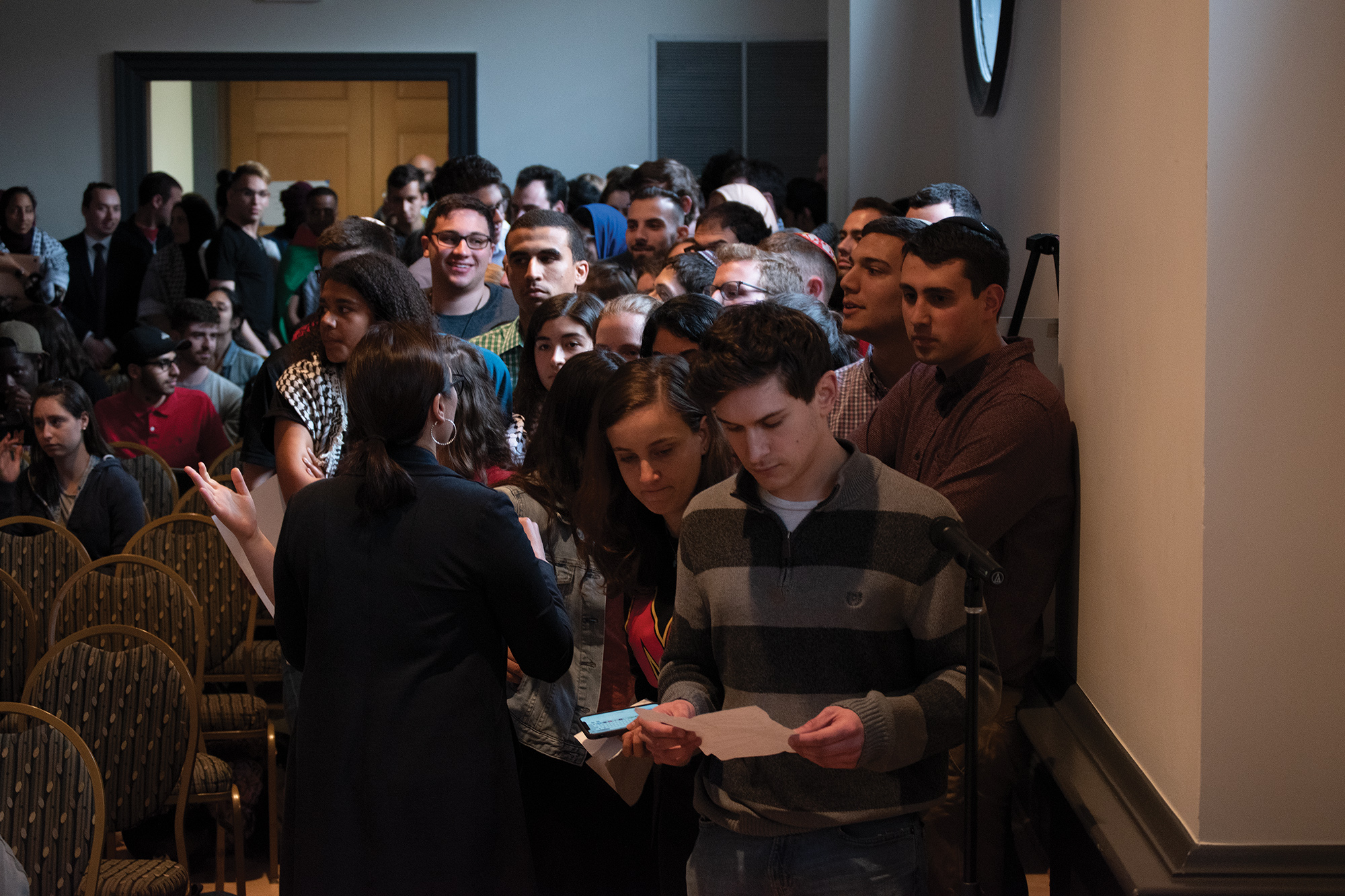University of Maryland students are divided on how to move forward, after the SGA rejected a resolution calling on the administration to divest from companies that supporters say fund humans rights violations in Palestinian territories.
Over 100 students spoke to the Student Government Association last month before the body rejected the proposal, which was inspired by the Boycott, Divest and Sanction movement. Many said the SGA should focus on facilitating dialogue between the two sides of the Israeli-Palestinian conflict — a task that could prove more difficult than it sounds.
“These students won’t even make that first step,” said Jenn Miller, a senior government and politics and Spanish major and president of Terps for Israel. “It’s almost like a vacuum. We’re having this conversation with ourselves.”
BDS supporters — who advocate economic resistance against Israel — view the movement as a protest against Israel’s treatment of Palestinians. Opponents, however, criticize it as anti-Semitic and over-simplified, arguing it shuts down conversation around the conflict.
Many of the 74 student opposing the resolution called for open discourse about the issue. But over two weeks after the vote, it remains unclear how — or if — that discourse will happen.
“There’s no compromising,” said Shivam Shukla, a Students for Justice in Palestine member. “There is no middle ground when it comes to human rights and equality.”
[Read more: UMD student groups criticize SGA president for speaking at AIPAC]
Shukla said SJP opposes discussions because the groups are not on equal ground. It’s common for Palestine supporters to receive targeted hate comments, he said, while the anti-divestment community has more institutional support on this campus.
They don’t, however, want to quarrel about BDS’ merits on behalf of the Palestinian people, he added — many of whom have expressed support for the movement.
“We would not engage in debate on whether or not BDS is good or bad,” he said. “It is what the Palestinians themselves have called for, so it is not our job to debate that.”
Still, he added, the group will continue to host tabling events to educate students — something they’re considering doing weekly to gather support for their cause.
Fifty-five students spoke in favor of the resolution before the SGA’s vote on April 24. Over the past year, schools across the country, including the University of Michigan, Northwestern University and Rutgers University, have debated similar divestment bills.
[Read more: UMD SGA strikes down BDS bill after five hours of discussion]
Last academic year, a divestment resolution at this university died in an SGA preliminary committee before reaching the legislative floor for debate. This year, there was over twice the amount of student opinions.
Ayomide Awobajo, the SGA’s Denton Community representative, spoke in favor of the resolution but said students who support divestment should be open to continuing that discussion.
“The only way to actually come to a solution is to sit down and have a conversation with one another,” Awobajo, a freshman information systems and marketing major, said.
He said the SGA could be helpful in facilitating more events between the two groups and keeping both sides civil, ensuring “a safe place to come and discuss how they feel.”
But Taylor Green, the SGA’s former diversity and inclusion director, said the body was not “equipped to have that conversation,” nor was Maryland Discourse, a student group that hosts debates.
Green said any discussion on the topic would require careful planning. Both sides would need to have equal numbers of people there, she said, and the event would need an adult facilitator as a moderator. She’d want the discussion to only include facts, because students “get caught up in their emotions.”
Green also noted the size of this university’s Jewish community — almost 20 percent of undergraduates — and that the majority of students involved in Jewish campus life are white, while many Palestine supporters are students of color. This puts the two sides of the conflict on unequal footing and complicates the process of setting up a debate, she said.
”I think one thing [Terps for Israel] doesn’t talk about is the power dynamics,” she said. “Palestinian students on this campus face different levels of marginalization.”
Miller said that although she understands the topic’s difficulty, she’s made an effort to attend SJP meetings and events despite feeling out of place.
“Don’t [they] think we feel the same way in their setting?” Miller asked. “I make the effort to go and sit and listen. I don’t see anyone in SJP ever coming to our events.”
Dan Alpert, vice president of Terps for Israel, agreed. He said that along with promoting educational tabling events for his group, he hopes to somehow foster dialogue with those who disagree with him.
“I think it’s important that everyone’s hearing each other’s side,” the sophomore government politics and marketing major said. “That’s something that I’m truthfully going to be pushing for.”



